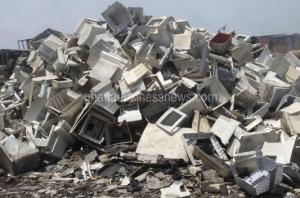Is the UK government serious about halting e-waste dumping in Ghana?

The British colonized Ghana for many years, and succeeded in building their economy with Ghana’s natural and human resources. But now they have turned Ghana into a dumping ground for their out of use electronics equipment.
It is known that electronics waste or e-waste contains a dangerous cocktail of poisonous chemicals that pose grave dangers to human life and the environment.
It is therefore, hard to understand why citizens of an advanced country, with all the wealth and resources to handle the e-waste that they have generated instead chose a poor and struggling country like Ghana to dump.
There is now overwhelming evidence that the UK has turned Ghana into a dumping ground for its e-waste. Earlier investigations by British journalists found damaged computers at the Agbogbloshie dump site in Accra with labels of the National Health Service (NHS). Some other computers with NHS labels were also found to be on sale at secondhand electronics equipment dealers’ shops in Ghana’s capital Accra.
Some PCs were also found to have come from UK local councils and universities, including Kent County Council, Southampton County Council, Salford University and Richmond upon Thames College (RUTC) and recently, a Ministry of Defence computer has been found.
On February 18, 2009 authorities in the UK arrested a man over the export of e-waste into developing countries. The 46-year-old man was not named but he was identified as from West Sussex. The countries he was exporting the e-waste to were never mentioned, and he was released on bail until May 5, 2009. Nothing is known yet about his prosecution.
The Independent, a UK newspaper did a report based on investigations it has conducted which revealed that despite ongoing investigations in the matter, toxic wastes from the UK continue to be dumped in Ghana and Nigeria.
The report says tonnes of toxic waste collected from British municipal dumps are being sent illegally to Africa in flagrant breach of the country’s obligation to ensure its rapidly growing mountain of defunct televisions, computers and gadgets are disposed of safely.
Hundreds of thousands of discarded items, which under British law must be dismantled or recycled by specialist contractors, are being packaged into cargo containers and shipped to countries such as Nigeria and Ghana, where they are stripped of their raw metals by young men and children working on poisoned waste dumps, the report said.
According to The Independent, in a joint investigation it carried out together with Sky News, and Greenpeace, they found that a television set that had been broken beyond repair was tracked to an electronics market in Lagos, Nigeria, after being left at a civic amenity site in Basingstoke run by Hampshire Country Council.
The publication remarked that under environmental protection laws of the UK, the TV set was classified as hazardous waste and should never have left the country.
In the face of these evidences, the UK Environment Agency (EA) initiated investigations into the matter. In personal correspondence I have hard with the EA in October 2008, The Senior Press Officer responsible for environment protection, Scarlett Elworthy admitted to me by email that the EA was investigating the incidents of e-waste dumping into Ghana. She promised, “I will be happy to provide you with an update once the investigation has concluded.”
It appears while the investigation has been ongoing since last year, the dumping continues. While it does, I have made persistent enquiries at the UK Agency, but have received no information as they keep telling me their investigation team is still investigating the matter.
If the UK authorities fail to act to stop their citizens who obviously are doing these together with some Ghanaians, our Ghanaian authorities should act.
The situation of e-waste in Ghana is grave – as human life and the environment are endangered.
By Emmanuel K. Dogbevi
Email: [email protected]
